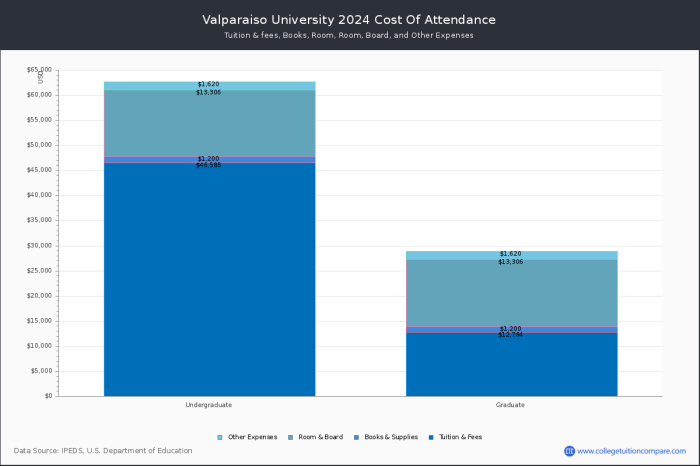Embarking on a journey through the intricacies of Valparaiso University’s tuition costs, this comprehensive guide unravels the financial aspects of pursuing higher education at this esteemed institution. Delving into the details of undergraduate and graduate programs, we’ll explore the various fees associated with tuition, scholarships, financial aid, and payment plans. Moreover, we’ll delve into the cost of living in Valparaiso, Indiana, and its impact on students’ budgets. Join us as we navigate the complexities of Valparaiso University’s tuition landscape, empowering you with the knowledge to make informed decisions about your academic future.
As we delve into the nuances of Valparaiso University’s tuition costs, it’s crucial to recognize the university’s commitment to academic excellence and affordability. With a long-standing reputation for providing high-quality education, Valparaiso University strives to make its programs accessible to students from all backgrounds. Through a combination of scholarships, financial aid, and flexible payment plans, the university endeavors to alleviate the financial burden associated with higher education, enabling students to focus on their academic pursuits.
Tuition Fees Overview
Valparaiso University offers a comprehensive education with a commitment to affordability. Tuition costs vary depending on the program and residency status. The following breakdown provides an overview of tuition fees for undergraduate and graduate programs.
Undergraduate Tuition
- Full-time undergraduate tuition for the 2023-2024 academic year is $38,200.
- Part-time undergraduate tuition is charged per credit hour, with a rate of $1,270 for the 2023-2024 academic year.
Graduate Tuition
- Tuition for graduate programs varies depending on the specific program and degree level. Graduate tuition rates for the 2023-2024 academic year range from $1,270 to $1,475 per credit hour.
Additional Fees
In addition to tuition, students may be responsible for additional fees, such as:
- Technology fee: $500 per semester
- Activity fee: $250 per semester
Residency Status
Residency status can impact tuition costs for undergraduate students. Indiana residents are eligible for a reduced tuition rate. For the 2023-2024 academic year, the full-time undergraduate tuition rate for Indiana residents is $28,960.
Scholarship and Financial Aid Options

Valparaiso University offers a comprehensive array of scholarships and financial aid programs to support students in achieving their academic goals. These include merit-based scholarships, need-based grants, and various loan options.
To be considered for merit-based scholarships, students must demonstrate academic excellence and leadership potential. The application process typically involves submitting transcripts, test scores, and a personal statement. Examples of successful scholarship recipients include students with exceptional GPAs, impressive extracurricular involvement, and a commitment to community service.
Need-Based Financial Aid
Students with financial need may qualify for need-based grants, which do not need to be repaid. The application process involves submitting the Free Application for Federal Student Aid (FAFSA). Based on the information provided, students will receive an award letter outlining the types and amounts of aid they are eligible for.
Loan Options
Students may also consider taking out loans to help cover the cost of tuition and other expenses. Valparaiso University partners with various lenders to offer a range of loan options, including federal student loans and private loans. It is important to carefully consider the terms and conditions of any loan before accepting it, as loans must be repaid with interest.
Payment Plans and Payment Deadlines
Valparaiso University understands that financing your education can be a significant undertaking. To assist students and families, the university offers a variety of payment plans and payment deadlines to accommodate different financial situations.
Payment Plans
Valparaiso University offers the following payment plans:
- Monthly Payment Plan: This plan divides the total cost of tuition and fees into 10 monthly payments, beginning in July and ending in April.
- Semester Payment Plan: This plan divides the total cost of tuition and fees into two equal payments, due at the beginning of each semester.
- Quarterly Payment Plan: This plan divides the total cost of tuition and fees into four equal payments, due at the beginning of each quarter.
Payment Deadlines
Payment deadlines vary depending on the payment plan you choose. The following are the payment deadlines for each plan:
- Monthly Payment Plan: Payments are due on the 1st of each month.
- Semester Payment Plan: The first payment is due at the beginning of the fall semester, and the second payment is due at the beginning of the spring semester.
- Quarterly Payment Plan: The first payment is due at the beginning of the fall quarter, the second payment is due at the beginning of the winter quarter, the third payment is due at the beginning of the spring quarter, and the fourth payment is due at the beginning of the summer quarter.
Consequences of Late Payments
Late payments may result in a late payment fee and/or a hold on your student account. A hold on your student account will prevent you from registering for classes, obtaining transcripts, or receiving your diploma.
Setting Up and Managing a Payment Plan
To set up and manage a payment plan, you will need to log into your MyValpo account. Once you are logged in, click on the “Billing” tab and then select “Payment Plans.” You will then be able to choose a payment plan and set up automatic payments.
Cost of Living in Valparaiso, Indiana

Understanding the cost of living in Valparaiso is essential for budgeting and planning your expenses as a student. Here’s an overview of the average expenses and tips for saving money.
Compared to other cities in the region, Valparaiso offers a relatively affordable cost of living. The city’s small-town atmosphere and proximity to larger urban areas contribute to its reasonable living expenses.
Housing
Housing costs vary depending on the type of accommodation you choose. On-campus housing ranges from $4,500 to $8,000 per academic year. Off-campus apartments or houses can cost between $600 and $1,200 per month, excluding utilities.
Food
Dining on campus is convenient but can be more expensive than cooking your own meals. The average cost of a meal plan ranges from $1,500 to $2,500 per semester. Groceries and dining out expenses can vary based on your dietary needs and preferences.
Transportation
If you have a vehicle, you’ll need to factor in gas, insurance, and parking expenses. Valparaiso has a good public transportation system, with bus fares starting at $1.50 per ride. Biking or walking can be viable options for shorter distances.
Tips for Saving Money
- Consider sharing an apartment or house with roommates to reduce housing costs.
- Cook meals at home instead of dining out frequently.
- Utilize public transportation or explore carpooling options.
- Take advantage of student discounts and free activities offered by the university and community.
- Explore part-time job opportunities to supplement your income.
Return on Investment

Investing in a Valparaiso University education can yield significant returns. Graduates enjoy strong employment prospects, earning competitive salaries and establishing successful careers.
According to the university’s Career Center, 98% of graduates are employed or pursuing further education within six months of graduation. The median starting salary for Valparaiso University graduates is $55,000.
Graduate Employment Rates
- 98% employed or pursuing further education within six months of graduation
Salaries
- Median starting salary: $55,000
Reputation and Alumni Network
Valparaiso University’s reputation as a top-tier institution opens doors for graduates. The university’s strong alumni network provides valuable connections and support throughout their careers.
FAQs
Is there a difference in tuition costs for undergraduate and graduate programs?
Yes, tuition costs vary depending on the level of study. Graduate programs typically have higher tuition rates than undergraduate programs.
Are there any additional fees associated with tuition?
Yes, there may be additional fees such as technology fees, activity fees, and course-specific fees. These fees vary depending on the program and courses taken.
Does residency status impact tuition costs?
Yes, Indiana residents typically pay lower tuition rates than non-residents. Some scholarships and financial aid programs also consider residency status.
What types of scholarships and financial aid are available?
Valparaiso University offers a range of scholarships and financial aid programs, including merit-based scholarships, need-based grants, and student loans. Eligibility and application processes vary for each program.
How can I set up a payment plan?
Students can set up a payment plan through the university’s online portal. Payment plans allow students to spread out their tuition payments over several installments throughout the semester.




